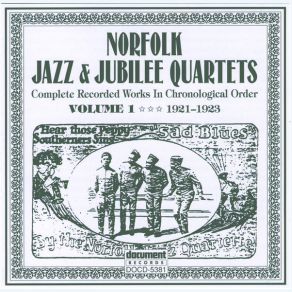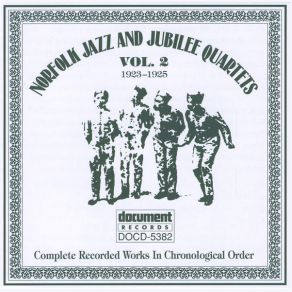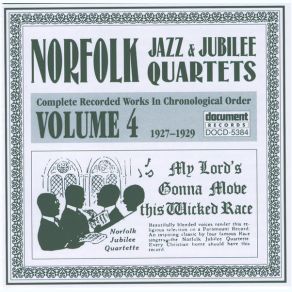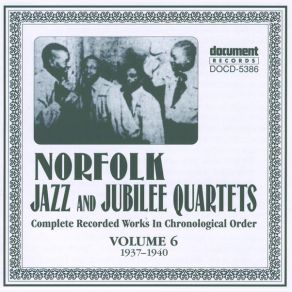Norfolk Jazz And Jubilee Quartet
Wikimp3 information about the music of Norfolk Jazz And Jubilee Quartet. On our website we have 6 albums of artist Norfolk Jazz And Jubilee Quartet. You can find useful information and download songs of this artist. We also know that Norfolk Jazz And Jubilee Quartet represents Blues genres.
Biography
[Edit]The vocal quartet alternately known as the Norfolk Jazz and the Norfolk Jubilee was the best known and most influential group of this sort to emerge from the Tidewater region of Virginia prior to the appearance of their best-known followers the Golden Gate Quartet. Founded by bass singer Len Williams and baritone Delroy Hollins, the Norfolks were performing in public as early as 1919 with Otto Tuston and James "Buddy" Butts singing tenor. Hollins acted as manager for the quartet and rehearsed them at home in his living room. During the early '20s they were mainly a vaudeville unit specializing in blues and jazz but also capable of singing gospel. From the get-go their signature sound was shaped by Len Williams, who anchored each song with scat-like rhythmic patterns in the bass clef which were strongly influenced by the jazz music of the day. The Norfolks cut their first records for Okeh in 1921 and appeared in a variety show starring vocalist Mamie Smith in Baltimore during the spring of the following year. They spent much of that summer with the Miller & Lyles musical revue The Flat Below, but were forced to withdraw after Butts was fatally attacked on August 19, 1922 by an enraged knife-wielding girlfriend.
It took awhile to find the right man to replace Butts. In April 1923, the Norfolks made their first Paramount recordings, now with Norman "Crip" Harris backing Tuston's leading tenor. Over the next few years, the group gradually took on more sacred material and recorded as the Norfolk Jubilee while still performing in vaudeville as the Norfolk Jazz. With few exceptions, most of their studio output during the years 1926-1929 was resoundingly religious, and these constitute some of the finest early gospel recordings in existence. During the Great Depression of the early ‘30s, they retreated back to Norfolk, mainly entertaining at house parties where bootleg liquor was supplied by Delroy Hollins. In 1932, Hollins quit following a disagreement with co-founder Len Williams who would serve as the group's no-nonsense manager for the rest of its existence.
Throughout most of the '30s, the quartet consisted of Williams, lead tenor Crip Harris, and two younger men who had been active in a Norfolk vocal unit known as the Watermelon Four: second tenor Raymond Smith and baritone Melvin Coldten. The reconstituted Norfolks performed regularly over radio station WGH in Norfolk, and began recording for Decca under the supervision of Mayo Williams in 1937. Once again offering a balanced selection of sacred and secular songs, they soon attracted a following in Harlem, where in 1938 they engaged in a heated vocal jousting match at Salem Baptist with Thermon Ruth's Selah Jubilees. Louis Armstrong hooked them up with his own manager, Joe Glaser, who booked them into the Jones Beach Resort with Guy Lombardo & His Orchestra.
When performing secular material, the Norfolk Jubilee Quartet was sometimes identified as the Four Alphabets, on-stage and during radio broadcasts over WGL, WMAC, and WLEW, where they appeared on the Martin Block program sponsored by Avalon Cigarettes. Although long established as an a cappella group, some of their 1937 recordings feature an unidentified tipple player, and for a while they worked with a very young aspiring jazz pianist by the name of Eddie Bonnemere. While he never recorded with them, he provided accompaniments both in church and at the clubs. He later became active as a jazz educator as well as a session pianist for Roost Records. By 1940, the Norfolks were still popular despite being eclipsed by the Golden Gates, the Ink Spots, the Deep River Boys, and the Charioteers.
The Norfolks' last booking was at the Famous Door on Broadway, and their final Decca recording session took place on April 20, 1940, resulting in a customary blend of jazzy secular blues and passionately religious airs. Len Williams was in church when he died "of asphyxiation" on June 2, 1940. The group quickly unraveled despite Coldten's attempts to hold them together. Coldten sang with the Selah Jubilees and with the Master Keys. Raymond Smith performed with the Cabineers and lived out his days tending bar. Crip Harris sang with the Selahs until he was slain while walking down the street in Harlem. During the '90s, most of the works of the Norfolk Jazz and Jubilee Quartet were chronologically reissued on CD in six volumes by the Document label.
Title: Norfolk Jazz and Jubilee Quartet Vol. 1 (1921-1923)
Artist: Norfolk Jazz And Jubilee Quartet
Genre: Blues
Title: Norfolk Jazz and Jubilee Quartet Vol. 3 (1925-1927)
Artist: Norfolk Jazz And Jubilee Quartet
Genre: Blues
Title: Norfolk Jazz and Jubilee Quartet Vol. 2 (1923-1925)
Artist: Norfolk Jazz And Jubilee Quartet
Genre: Blues
Title: Norfolk Jazz and Jubilee Quartet Vol. 5 (1929-1937)
Artist: Norfolk Jazz And Jubilee Quartet
Genre: Blues
Title: Norfolk Jazz and Jubilee Quartet Vol. 4 (1927-1929)
Artist: Norfolk Jazz And Jubilee Quartet
Genre: Blues
Title: Norfolk Jazz and Jubilee Quartet Vol. 6 (1937-1940)
Artist: Norfolk Jazz And Jubilee Quartet
Genre: Blues





